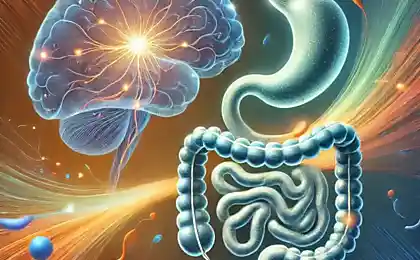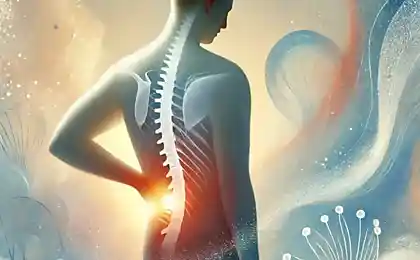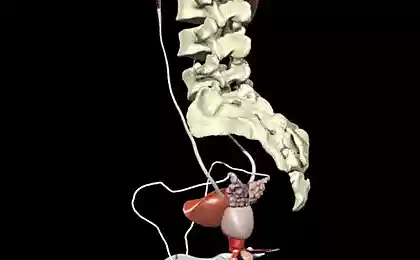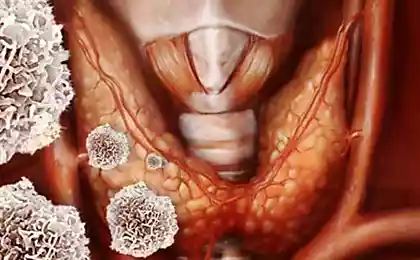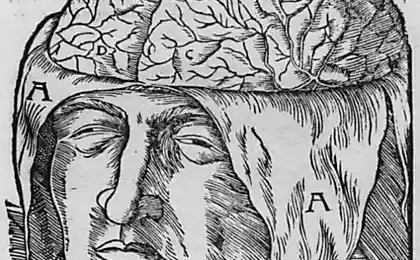549
Psychosomatic disease: Where it comes from
The body internally is going through everything we carefully concealed, even from themselves. Sooner or later the problems have an effect, manifesting psychosomatic symptoms. "Cries the brain, and tears in the heart, liver, stomach..." — wrote the famous Russian scientist, doctor and psychologist Alexander Luria. The term "psychosomatics" was introduced into scientific use the German doctor Hanrot 180 years ago. Painful phenomenon called psychosomatic only when there is a direct correlation between their occurrence and the corresponding psycho-emotional factors and traumatic events.
In our days, psychosomatic disorders (RPS) are increasingly common in childhood. Unfortunately, pediatricians don't know much about them, but because these diseases remain unrecognized.
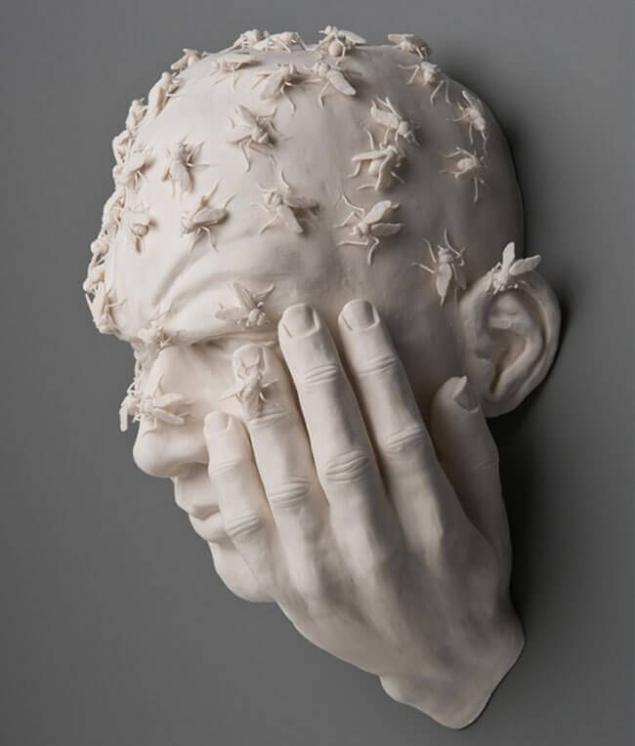
©Kate MacDowell
Painful ranking 1st place among the AKP is a psychogenic disorders of the gastrointestinal tract (chronic gastritis and gastroduodenitis, biliary dyskinesia, reactive pancreatitis, rarely peptic ulcer and duodenal ulcer).
Closely linked to digestive disorders with neuro-psychiatric field has long been known. No wonder psychologists are figuratively referred to as the gastrointestinal tract "sounding on emotion." In unbalanced children at the slightest excitement, anger, pain, fear and anxiety arise nausea and vomiting, and calm the kids nothing like experience.
Some students with morning sickness (rarely heartburn) and even vomiting appear before an important exam or test. These children are often found migrating abdominal pain. Not too strong, it increases the excitement and nervous tension associated with food intake and its features. When examining these patients, no pathology detected.
2nd place was taken by the AKP skin — eczema, exudative catarrhal diathesis and atopic dermatitis that modern allergists are United under the name "atopic dermatitis".
3rd place is given to motor disorders (tics, hyperkinesis, seizures).
4th place belongs to the AKP endocrine (amenorrhea, dysmenorrhea, juvenile bleeding, anorexia nervosa and obesity) that occur frequently in adolescent girls.
5th place is occupied by the AKP in the form of headache and other pain.
Where it is taken To produce a psychosomatic illness must match several factors: genetic predisposition ("where subtly there and tear"), personality characteristics and temperament of the child, social background and traumatic events, superimposed on this adverse background and causes internal to detonate the bomb.
The personal risk factors of AKP
Temperament
* low threshold of sensitivity to stimuli (nervous kid")
* intense reactions to external stimuli ("irritable child")
*difficulty adapting to new experiences with a predominance of negative emotions ("brat")
Personality - introverted, reserved, distrustful, anxious, sensitive, insecure kid whose negative emotions outweigh the positive.
Psychosocial factors
The kids of 3-5 years, the main negative emotion coming out in the form of the AKP, repressed aggression, in adolescents and its place is depression. Because depression is aggression turned against himself. The rejection of children's aggression is the inevitable tribute to pay for socialization. The grown man, not timely learn to Express anger and to get rid of it, carries this burden into adulthood. That's why depression is the underlying assumption of any RPS at teenagers.
Depressive Adolescents with AKP often suffer from depressive States, especially the so-called subdepressive and hidden depression. Children complain of mood (bad or "no"), boredom (often in the evening, sometimes during the day, rarely in the morning), the reluctance to do anything, indifference or irritation towards others.
This teenager needs medication and psychotherapy, especially family. Its goal is to change the current home behaviors, and perceptions of the child. Parents should create a favorable psychological climate, how to treat their offspring, to learn trust, encouraging, warm relationships with children so necessary for the prevention of PSR.
It is important to prevent formation of the child's inflated claims for itself — it contributes to neuroticism and increases the likelihood of the AKP.
Aggressive reactions are the Main thing that you need to understand that the baby has the same right to aggressive feelings as you are. You should take it like that either. Calm attitude to the fact that your child is able not only to love and be happy, but to be angry, to hate, to resent, to be offended, including you.
Many moms and dads deny the kid the right to expression of aggression, leaving him behind. "Don't hit!" the Pope says, and slaps the kid. "Don't shout!" shouts to the kid's mom. And then in the mind of the crumbs settled idea that he is feeling and expressing negative feelings are somehow forbidden. Parents often themselves executed after the outbreak of aggression, not taking themselves as such. To accept it means to accept what you have in mind, there are aggressive feelings, not appreciating that it is bad or good.
Their appearance of the baby is the result of mental strain (could not build a pyramid, to button up, wear a glove): help the child to remove it. Children still do not know how to get rid of such tension. They cry, stomp their feet, waving their hands, giving the output of the motor manifestation of negative feelings. By the way, this is the most healthy way. Otherwise, in the best case formed body stiffness, and in the worst accumulated aggression. Constantly suppressed, it provokes the emergence of the AKP.
Allowing the child to Express feelings, you learn to do it safely for yourself and others. Instead of rage and beat my head against the wall or floor, offer the kid to box out the cushion, letting the steam out.
For the prevention of PSR, it is important to encourage your child to speak the language of their feelings, expanding their vocabulary, because to name is to understand. Explain to the child what he is experiencing. What it is — anger, resentment, irritation? Say, "You are offended! I know what you mean. Let's shout together, until your resentment will not pass!".
Do not leave a child alone with strong feelings — because he doesn't know what to do with them! Saying "What are you shouting, I love you so won't you give the kid to understand that when he is angry — he is bad. But it is not so! Help Chad to grow up and get over children's tantrums.
Do not mix negative feelings of the child with restrictions that caused them. If you say, "Yes, I understand you, you got angry" — it does not mean that you will break down and buy the kid a third ice cream. Say firmly and calmly "No, my good! Ice cream for today's over," and be ready to deal with the response of the child. Do not give in to blackmail hysterical: so will you help him to cope with aggression, but simply raise the paddle. published
Author: Pauline Gaverdovsky
P. S. And remember, only by changing their consumption — together we change the world! ©
Source: gaverdovskaya.ru/public/old/story653.htm
In our days, psychosomatic disorders (RPS) are increasingly common in childhood. Unfortunately, pediatricians don't know much about them, but because these diseases remain unrecognized.

©Kate MacDowell
Painful ranking 1st place among the AKP is a psychogenic disorders of the gastrointestinal tract (chronic gastritis and gastroduodenitis, biliary dyskinesia, reactive pancreatitis, rarely peptic ulcer and duodenal ulcer).
Closely linked to digestive disorders with neuro-psychiatric field has long been known. No wonder psychologists are figuratively referred to as the gastrointestinal tract "sounding on emotion." In unbalanced children at the slightest excitement, anger, pain, fear and anxiety arise nausea and vomiting, and calm the kids nothing like experience.
Some students with morning sickness (rarely heartburn) and even vomiting appear before an important exam or test. These children are often found migrating abdominal pain. Not too strong, it increases the excitement and nervous tension associated with food intake and its features. When examining these patients, no pathology detected.
2nd place was taken by the AKP skin — eczema, exudative catarrhal diathesis and atopic dermatitis that modern allergists are United under the name "atopic dermatitis".
3rd place is given to motor disorders (tics, hyperkinesis, seizures).
4th place belongs to the AKP endocrine (amenorrhea, dysmenorrhea, juvenile bleeding, anorexia nervosa and obesity) that occur frequently in adolescent girls.
5th place is occupied by the AKP in the form of headache and other pain.
Where it is taken To produce a psychosomatic illness must match several factors: genetic predisposition ("where subtly there and tear"), personality characteristics and temperament of the child, social background and traumatic events, superimposed on this adverse background and causes internal to detonate the bomb.
The personal risk factors of AKP
Temperament
* low threshold of sensitivity to stimuli (nervous kid")
* intense reactions to external stimuli ("irritable child")
*difficulty adapting to new experiences with a predominance of negative emotions ("brat")
Personality - introverted, reserved, distrustful, anxious, sensitive, insecure kid whose negative emotions outweigh the positive.
Psychosocial factors
- improper training — lack of or inadequate parental care, excessive pressure from parents, the feud between family members
- stress in the preschool — a long-hour stay in the nursery, garden, health resorts
- stress in school — her shift, pressure from the teachers, the atmosphere of rejection or hostility, the conflict situation in the class
- nesamani stressful situation — the isolation of the family from relatives, threat of war, terrorist act, criminal prosecution, loss of job or apartment
The kids of 3-5 years, the main negative emotion coming out in the form of the AKP, repressed aggression, in adolescents and its place is depression. Because depression is aggression turned against himself. The rejection of children's aggression is the inevitable tribute to pay for socialization. The grown man, not timely learn to Express anger and to get rid of it, carries this burden into adulthood. That's why depression is the underlying assumption of any RPS at teenagers.
Depressive Adolescents with AKP often suffer from depressive States, especially the so-called subdepressive and hidden depression. Children complain of mood (bad or "no"), boredom (often in the evening, sometimes during the day, rarely in the morning), the reluctance to do anything, indifference or irritation towards others.
This teenager needs medication and psychotherapy, especially family. Its goal is to change the current home behaviors, and perceptions of the child. Parents should create a favorable psychological climate, how to treat their offspring, to learn trust, encouraging, warm relationships with children so necessary for the prevention of PSR.
It is important to prevent formation of the child's inflated claims for itself — it contributes to neuroticism and increases the likelihood of the AKP.
Aggressive reactions are the Main thing that you need to understand that the baby has the same right to aggressive feelings as you are. You should take it like that either. Calm attitude to the fact that your child is able not only to love and be happy, but to be angry, to hate, to resent, to be offended, including you.
Many moms and dads deny the kid the right to expression of aggression, leaving him behind. "Don't hit!" the Pope says, and slaps the kid. "Don't shout!" shouts to the kid's mom. And then in the mind of the crumbs settled idea that he is feeling and expressing negative feelings are somehow forbidden. Parents often themselves executed after the outbreak of aggression, not taking themselves as such. To accept it means to accept what you have in mind, there are aggressive feelings, not appreciating that it is bad or good.
Their appearance of the baby is the result of mental strain (could not build a pyramid, to button up, wear a glove): help the child to remove it. Children still do not know how to get rid of such tension. They cry, stomp their feet, waving their hands, giving the output of the motor manifestation of negative feelings. By the way, this is the most healthy way. Otherwise, in the best case formed body stiffness, and in the worst accumulated aggression. Constantly suppressed, it provokes the emergence of the AKP.
Allowing the child to Express feelings, you learn to do it safely for yourself and others. Instead of rage and beat my head against the wall or floor, offer the kid to box out the cushion, letting the steam out.
For the prevention of PSR, it is important to encourage your child to speak the language of their feelings, expanding their vocabulary, because to name is to understand. Explain to the child what he is experiencing. What it is — anger, resentment, irritation? Say, "You are offended! I know what you mean. Let's shout together, until your resentment will not pass!".
Do not leave a child alone with strong feelings — because he doesn't know what to do with them! Saying "What are you shouting, I love you so won't you give the kid to understand that when he is angry — he is bad. But it is not so! Help Chad to grow up and get over children's tantrums.
Do not mix negative feelings of the child with restrictions that caused them. If you say, "Yes, I understand you, you got angry" — it does not mean that you will break down and buy the kid a third ice cream. Say firmly and calmly "No, my good! Ice cream for today's over," and be ready to deal with the response of the child. Do not give in to blackmail hysterical: so will you help him to cope with aggression, but simply raise the paddle. published
Author: Pauline Gaverdovsky
P. S. And remember, only by changing their consumption — together we change the world! ©
Source: gaverdovskaya.ru/public/old/story653.htm


